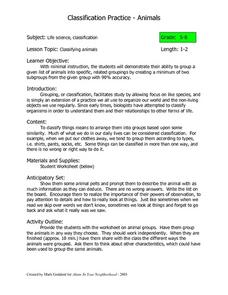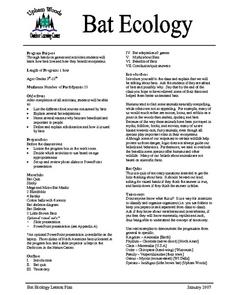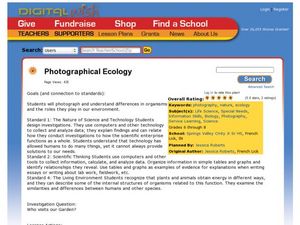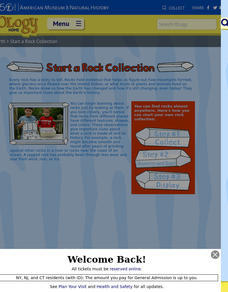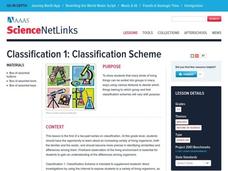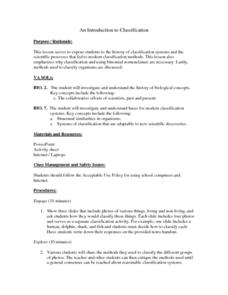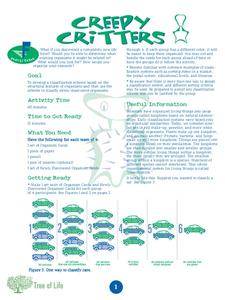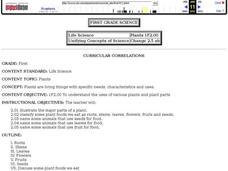Curated OER
Classification Practice-Animals
Students use pictures of animals to make a classification system. In this classification lesson plan, students are given pictures of different animals. They create a classification system for the animals and identify what they have in...
Curated OER
Life in a Forest Stream
Students assess macro-invertebrates from a stream. In this science lesson plan, students observe, classify and identify organisms found in a stream. A lab station is constructed at the stream sight and students study the different...
Curated OER
Bat Ecology
Young scholars, through hands on games and activities, discover how bats live and how bats benefit ecosystems. They play a game designed to show them how echolocation works and another to show how mother bats locate their young through...
Curated OER
Food and Nutrition
Students participate in an after school program that promotes decision making, cooperation, choosing healthy foods, recognizing and naming a variety of foods, state healthy benefits from eating healthy foods and involving oneself in...
Curated OER
Photographical Ecology
Learners study organisms and the roles they play in nature. In this ecology lesson, students photograph several examples of organisms during a nature walk. Learners print out their photos and classify the organisms as plants or animals.
Curated OER
It's not just pretty - it's a survival method!
First graders write explanations for why certain animals can only live in certain environments. In this animal survival lesson plan, 1st graders take pictures of animals and place them into the right environment after a instructional...
Nature New Brunswick
Habitat for Endangered Wildlife and You
Compare and contrast your habitat with that of endangered plants and animals! Learners discuss what a habitat is actually comprised of, describing what theirs looks like. They fill out a graphic organizer explaining what they eat, how...
American Museum of Natural History
Start a Rock Collection
Rocks hold evidence of Earth's past. A three-step guide describes the process of creating a rock collection. It provides a data collection sheet to make notes about each sample.
Curated OER
Environmental Conditions: Friend or Foe
Students research and answer questions on how organisms are classified and how their needs are met through their environment. They work in small groups and create a poster, chart, rap, PowerPoint, or brochure demonstrating how organisms...
Curated OER
Creature Features
Young scholars examine why certain animals live in only specific places throughout the world. Using animals, they classify them based on their characteristics and identify their basic needs. They also observe and compare the life cycles...
Curated OER
Dinosaurs
Students study the lives of dinosaurs. In this dinosaur instructional activity, students create dinosaur dioramas that depict how and where the creatures lived. Students also discuss extinction with their teacher.
Curated OER
The Seven Characteristics of Life
Third graders investigate the characteristics of living and nonliving things. They conduct a research quest in order to identify the seven characteristics of life. Then students pick one aspect and use it to create a song meant to be...
Curated OER
An Introduction to Classification
Sixth graders explore, analyze and study the history of classification systems and the scientific processes that influenced modern classification methods. They evaluate why classification and binomial nomenclature are necessary to the...
Curated OER
Incredible Seeds
Second graders are given a group of seeds and put in small groups. They classify their seeds based on their observations with 90% accuracy. Students draw a picture of each seed showing at least 2 characteristics of each. They write 1...
Curated OER
Scientific Classification
In this scientific classification worksheet, students read about classification and the questions scientists ask in order to classify, then read about features of different classifications of animals. Worksheet is informational, no...
Curated OER
The Animal Kingdom of Vertebrates
Seventh graders classify fish according to their characteristics. In this classification lesson students learn how to group animals including birds, reptiles and amphibians.
Curated OER
Classification is Sweet
Students classify, weight and organize items during this lesson. This lesson works great as or with an introduction of the Periodic Table of Elements.
Curated OER
Species Diversity and Phylogeny
Students explore the classification system of organisms: taxonomy. They examine prepared slides of Protozoans and record information on a Taxonomy Recording Sheet. Two additional classifying activities are also included in this lesson.
Curated OER
Creepy Critters
Learners classify imaginary newly discovered organisms. In this classification lesson, students are given cards showing imaginary organisms that have been recently discovered. They must classify the organisms based on their characteristics.
Curated OER
Fish Haunts
Students examine some of the different ecosystems that fish live in. While doing this they identify the species of fish and the ecological conditions needed for survival. Students use research resources to make fish cards that have...
Curated OER
Thematic Unit on Cats
Students discover in which climates the cats of the world live in. They review the different climates of the world and use maps and globes to help them locate continents.
Curated OER
The Touch N Feel Box
Students discover the characteristics of living and non living objects without the use of sight. In this sense of touch lesson, students touch items put in a shoe box and must identify whether the item was once living or not by...
Curated OER
Mammals Have hair or Fur
First graders complete computer activities, make a mask, separate pictures, and more having to do with mammals. In this mammals lesson plan, 1st graders classify animals as being mammals or non mammals based on their hair or fur.
Curated OER
Plants
Learners illustrate the major parts of a plant, classify some plant foods we eat as roots, stems, leaves, flowers, fruits and seeds. They also name some animals that use seeds, leaves, and fruit for food.


